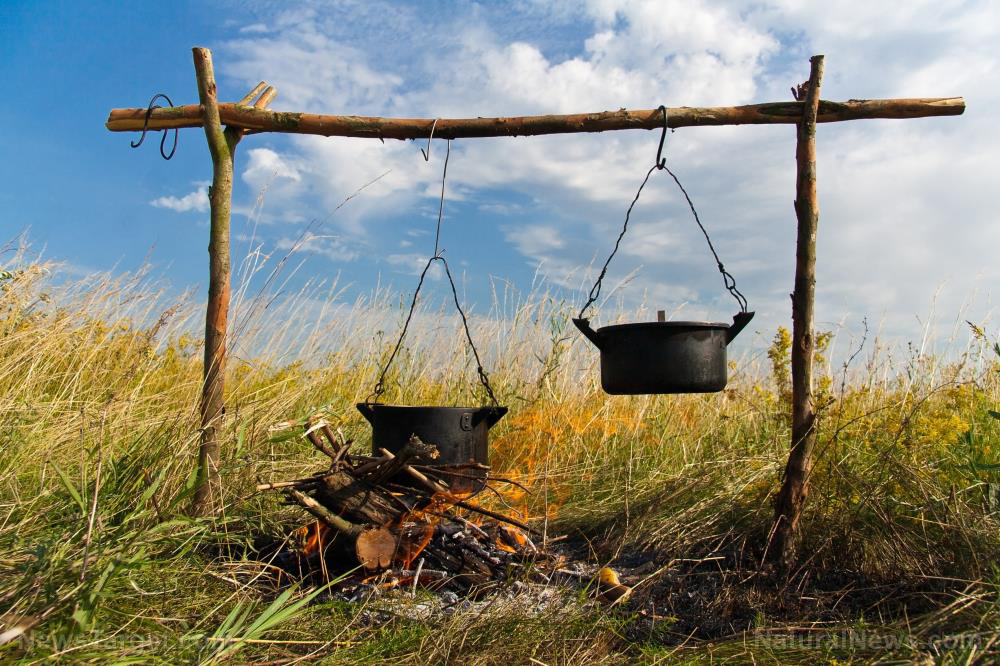
It is best to use fresh herbs when cooking or preparing herbal remedies, but a lot of herbs are just as useful when preserved.
Not sure where to start? Harvest herbs before they start to bloom, then check out the eight different herb preservation methods listed below:
Drying
Dry herbs that you'll be cooking with, along with medicinal herbs or flowers for teas.
When the herbs are dry, remove the leaves from the herb's woody stems, then store the dried leaves in a clean jar or container. Always label your dried herbs to avoid mixing up your ingredients.
Air-drying
Wash the herbs, then bundle up the sprigs with twine or string. Hang the herbs upside down by their stems in an area with good circulation, but out of direct sunlight. (Related: Survival medicine: Use wild lettuce as a natural painkiller and sedative when SHTF.)
To dry flowers, spread the petals on clean colanders, tea towels, trays, screens, or bowls. Set the flowers to dry out of direct light.
Use your fingers to sift through the herbs daily to make them dry evenly.
Dehydrator
Place herbs in a single layer on dehydrator trays. Dry at 95 F or until the herbs start crumbling.
Oven
Set your oven to 175 F, or the lowest temperature the oven will go, then lay out the herbs on a baking sheet. Make the layers even and check every 30 minutes.
Bake until the herbs are dry to the touch but still green, which should take one hour or more.
Freezing
Freeze herbs that you add to dishes with sauces or soups. Frozen herbs may lose their texture and the color may fade, but they'll retain most of their flavor as well as their healing properties.
To do this, you must first finely chop your fresh herbs, then pack them into an ice cube tray. Fill the tray with water, then freeze until solid. You can then transfer the cubes into a bag or an airtight container.
When you're ready to cook, add a couple of cubes into your dish. This method is best for basil, especially when you're making tomato soup.
Herb pesto also suits this method. Fill four-ounce jars with pesto, then store them in the freezer. For smaller portions, freeze pesto in ice cube trays. Frozen pesto will be a little discolored, but it will taste the same as a fresh batch.
You can also freeze beautiful, edible flowers in ice cube trays and add them to summery drinks or iced tea.
Preserving herbs in alcohol (tinctures)
Tinctures or extracts contain herbs preserved in alcohol. Herbal tinctures are usually administered by the dropperful and have potent medicinal remedies.
When preserving palatable herbs, you can turn a tincture into a liqueur with the same medicinal properties by adding simple syrup.
Another option includes herbal bitters, which are made by extracting bitter digestive herbs in alcohol.
Below are some herbal tinctures that you can try making:
- Echinacea and goldenseal tincture to fight colds and bacterial infections.
- Shepherd's purse tincture to stop bleeding
- Valerian root tincture to ease muscle pain and as a natural sleep aid.
- White willow tincture to relieve headaches and general pains.
Preserving herbs in honey
Add herbal honey to tea or use it while cooking. Use floral-infused honey to sweeten scones or drizzle it on cheese.
Thyme honey is a natural remedy for a gentle cough and cold. Honey infused with savory herbs pairs well with dishes like glazed roasted vegetables.
To create your own herbal honey, you must first wash and thoroughly dry the herbs you want to use. Next, fill a jar half-full of the dried herbs, then add enough honey to cover the herbs. Let the jar steep in a warm spot, like a sunny windowsill, for about two weeks. Once you're done, strain the honey if desired, then store in a cool area or your fridge.
Preserving herbs in oil
Oil doesn't preserve the plant part but helps save the flavor of your herbs. Use this method to make herb-infused oils for savory dishes.
Put clean and dried herbs in a clean jar then pour in enough oil so that the herbs are completely submerged. Store the jar in a cool and dark area and let it infuse for four to six weeks.
Note that herbs and oils are both low-acid and that combining them may support the growth of mold or botulism bacteria. According to The National Center for Home Food Preservation, oils flavored with fresh herbs should only be refrigerated and used within two to three days.
Preserving herbs as oxymels
An oxymel is a herbal syrup that contains both honey and raw cider vinegar.
To make an oxymel, you need to combine equal parts herb, raw honey, and raw apple cider vinegar. The herb extracts, together with the honey and vinegar, produce a pleasant probiotic herbal syrup.
Preserving herbs with salt or sugar
Place chopped, sprigs or whole leaves of fresh herbs in a clean jar with salt or sugar. Herbal salts with basil, rosemary or thyme suit savory dishes. You can also sprinkle them on fish or meat.
Sugars infused with herbs like lavender, lemon or mint taste great on cookies.
Preserving herbs in vinegar
This method doesn't always preserve the herb itself, but it infuses vinegar with the herb’s flavor or healing properties.
Any kind of vinegar can be used for this method, but wine vinegar is often used for culinary uses. When making medicinal herbs, use apple cider.
To create this, you must first wash the herbs before placing them in a clean jar. Pour vinegar into the jar and let the mixture infuse for three to four weeks. After steeping, you may strain and discard the herbs if you want, since keeping them in the jar will cause the mixture to get stronger over time. You may then rebottle the vinegar.
Use the herb-infused vinegar as a natural salad dressing.
Prep before SHTF and preserve useful medicinal herbs using the methods detailed above.
Sources include:
Please contact us for more information.























